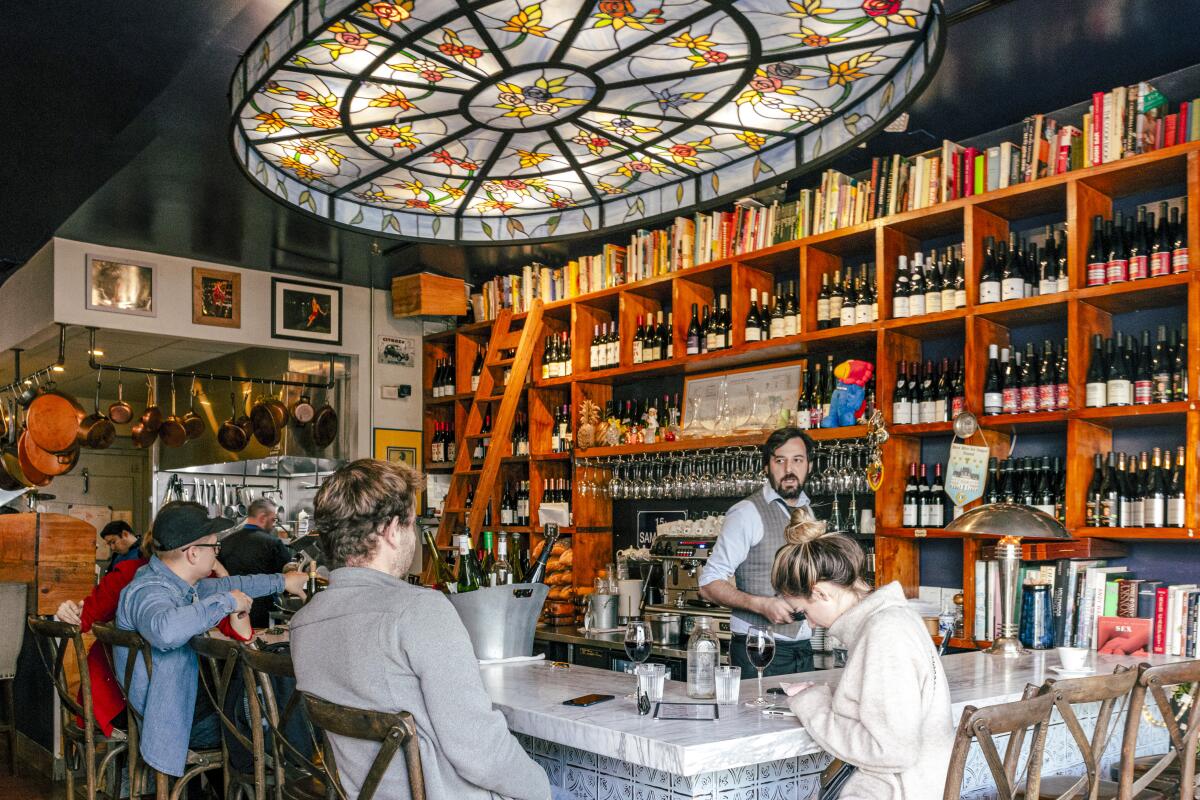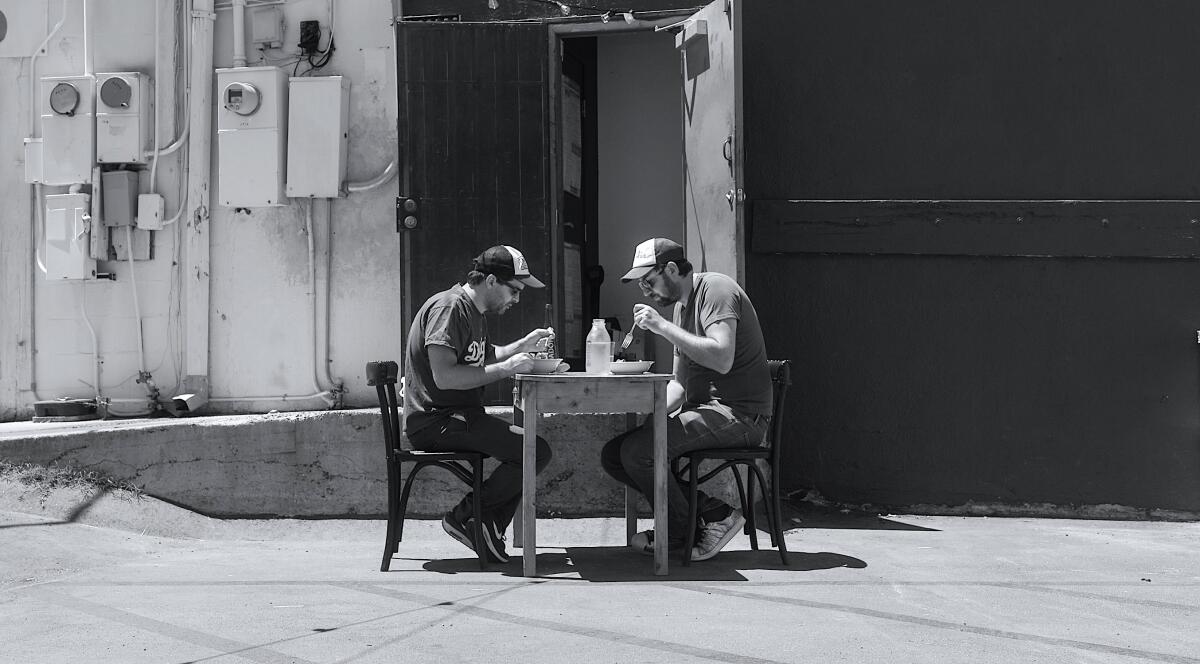New documentary ‘Belle Vie’ follows the pandemic journey of a West L.A. restaurant

- Share via
In the last two years, the National Restaurant Assn. estimates that roughly 90,000 restaurants have experienced a long-term shutdown or permanent closure due to the pandemic. Belle Vie, the charming French bistro tucked between a Kentucky Fried Chicken and a McDonald’s along a West L.A. stretch of Wilshire Boulevard, was one of them — but you’d never know it by Vincent Samarco’s disposition.
“[I’m] ready to do anything to try to save the business,” Samarco said on camera in July 2020, dumping fertilizer into large wooden containers. “Look at me, trying to plant some trees in an alley behind a McDonald’s.”
That scene and so many others are stitched together in a new documentary that’s a portrait of an optimistic and determined restaurateur trying something — anything — to keep his small business afloat. That documentary, simply titled “Belle Vie,” premieres March 9 at the Santa Barbara Film Festival and offers a uniquely intimate glimpse — seen through the lens of Samarco, his wife and his chef — of the struggles of restaurants and bars hoping to survive since the dining shutdown in March 2020.
Throughout pivots, personal loss, bankruptcy and near-constant roadblocks and red tape, the Parisian never seems to lose his sense of humor. “I think if the restaurant industry doesn’t work for me, I could definitely be Santa — I mean, my beard is starting to be white already,” Samarco says in another scene, strapping a Christmas tree to the roof of his little green truck.
Indeed, Samarco’s humor and geniality are what inspired filmmaker Marcus Mizelle to turn his camera on the third-generation restaurateur. The director, producer and writer was already a regular at the restaurant, where he happened to place an order for pickup in spring of 2020; he made small talk with Samarco about how Belle Vie was faring, and Mizelle got halfway to the front door before the light bulb went off. He turned around and asked if he could start filming the restaurant’s progress.
“What popped in my head, from a storyteller standpoint, is No. 1, you have this wonderful protagonist — colorful, nice, wonderful — it was a no-brainer,” said the director, whose previous documentary, “Something in the Water: A Kinston Basketball Story,” won a Midsouth Regional Emmy Award last week. “But you also have this conflict — the pandemic — and you also have this adaptation he was about to go toward. That’s like one half of the hero’s journey right there. It just instinctively made sense.”
Samarco opened Belle Vie on Aug. 1, 2016, renovating a 1960s restaurant space on a shoestring budget; it wasn’t much, but it was what he could afford, and he was determined to make it his own. He built a marble-topped bar and wooden cubbies for row upon row of French wine, placed an upright piano near the door and hung an atmospheric stained-glass light fixture from the ceiling. The kitchen, fronted by Samarco’s longtime friend Cedric Nicolas, turned out a rotation of French classics such as moules marinière, steak tartare, roast chicken with morel sauce, and an array of specials displayed in a loopy cursive on the chalkboard. In 2019 business was good; the team had entered 2020 optimistically, blissfully unaware of what was to come.
At times the documentary feels more like an artifact than a film, providing a front-row seat to one of the most trying eras in restaurant history — from Belle Vie’s early takeout-only days of fitting a whole branzino into a small aluminum takeout box with half a lemon and flipping the wine list to retail, to an attempt at welcoming diners back on-site by adding stylish deep-blue plexiglass between booths and Samarco constructing a patio himself. (“If not, it’s bankruptcy tomorrow,” he says in the film, shaking his head while building his patio in the alley. )

Mizelle estimates that he shot somewhere between 125 and 150 hours of footage over the course of 35 days in 2020 and 2021. There are days at the restaurant, days spent shopping for supplies, days in France visiting Samarco’s family, days in the restaurateur’s home in L.A. spent reflecting, cooking, drinking wine. The final documentary took 46 cuts to reach its now-whittled form, a 77-minute version; the cut that will air on KCET on March 15 runs 58 minutes.
Fans of Samarco’s neighborhood restaurant — where the walls were littered with art given to him by regulars and where weekly live music came pouring out the doors — already know the ending, or at least the ending for the bistro: Belle Vie permanently closed in December 2020. We see Samarco removing the artworks from the walls, one by one, a collection assembled piece by piece over the years: a customer’s sketch of the owner behind the bar, photos of his family and friends in France. He takes down the copper pans owned by his grandfather.
“A year ago we were killing it,” he tells the camera, referring to 2019.
Despite the setbacks of the last two years, Samarco has his sights set on opening another restaurant in Los Angeles, something a bit different from his low-lighted bistro, and something with takeout built into the concept from day one. It won’t be French, he says, at least not at first. He simply misses the community built and created through owning a restaurant.
“When I look at the numbers, it’s day and night as a French restaurant, which I’m very sad about,” he said in an interview. Food costs are high generally, and extremely high for a Frenchman who wants to sell scallops or duck magret. Better, he thinks, to skew toward something that travels well and requires less ingredient overhead, such as pizza. “I do want to reopen a French restaurant, I’m just too afraid right now. I lost everything.”
But while Belle Vie, the restaurant, is gone, “Belle Vie,” the documentary, is just the beginning for Samarco and Mizelle. The duo plan to shoot a TV pilot for a food-oriented travel show in France this spring, and they’ve grown close over the last two years: They spent last Christmas and Thanksgiving together, they play poker, and they talk multiple times a week. On the day of Mizelle’s interview, they were seeing a movie together four hours later. “He’s one of my best friends now,” the filmmaker said.
Belle Vie is a state of mind, Samarco said, and restaurants won’t die out; people need to socialize. Even if he doesn’t open another restaurant, he still has a home kitchen for sitting and cooking and sharing with friends like Mizelle. It’s a beautiful life, after all.
After “Belle Vie” screens in Santa Barbara March 9 and 12, it will air on KCET on March 15 and be available on demand beginning April 4. For updates, follow @marcusmizelle on Instagram.
More to Read
Eat your way across L.A.
Get our weekly Tasting Notes newsletter for reviews, news and more.
You may occasionally receive promotional content from the Los Angeles Times.











